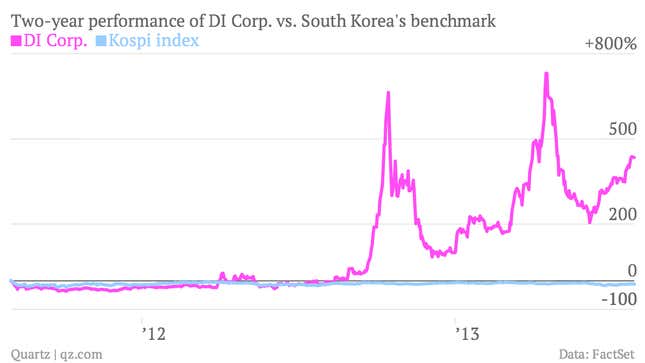So, there’s no reason this should have happened.
But shares of DI Corp., a South Korean company that makes testing equipment for the semiconductor industry, shot up last year. The reason? Perhaps, you say, a robust increase in the company’s earnings fundamentals, which was digested by the best and brightest investors that make up the market’s hive mind? Hah!

No, of course not. A big part of the increase is related to the fact that the company was founded by the father of Psy, the Korean pop rapper whose Gangnam Style remains the all-time most viewed YouTube video. Psy-daddy Park Won-ho remains the controlling shareholder and chairman of DI Corp.
No, really. Seriously. This seems to be why the company shares surged. Economists Andy Kim and Ho Sung Jung published a paper on the phenomenon earlier this month.
We find that the number of unique countries where non-resident foreign institutional investors place orders for the DI Corp. stock (excluding offshore Koreans) more than doubled after “Gangnam Style” was released … In addition, using the count of parody videos and flash mobs uploaded on YouTube from each country as a proxy for the enthusiasm of individual investors about DI Corp., we find that non-resident (resident) foreign individual investors become net buyers (sellers) when the count of the uploads increases in their country.
So what’s really going on here? Do investors think that the prospects of Psy’s dad’s company are really going to improve because of Psy’s musical success? No. According to the writers of the paper, the performance of the shares seems to support the so-called “investor recognition hypothesis.” Pioneered by Nobel laureate Robert Merton—who later got mixed up in the famous collapse of Long-Term Capital Management—this is a pretty simple theory. Essentially, it argues that investors are more likely to buy and sell stocks that they know about. (Seems logical.)
So the fact that Psy’s father’s company simply got a mention in a number of stories around the time that Gangnam Style exploded into the global consciousness basically expanded the number of people that knew about the stock, pushing demand and prices up. (And just looking at the chart, above, it seems like the shares got a secondary boost around the time that Psy’s next video, “Gentleman,” was released in April 2013.)
“The diffusion of attention-drawing yet non-informative coverage in different language-based media in various countries makes it plausible to hypothesize that more individual and institutional investors outside Korea may have become aware of the company for the first time. In such a case, a part of the stock price increase would be permanent, according to Merton.”
